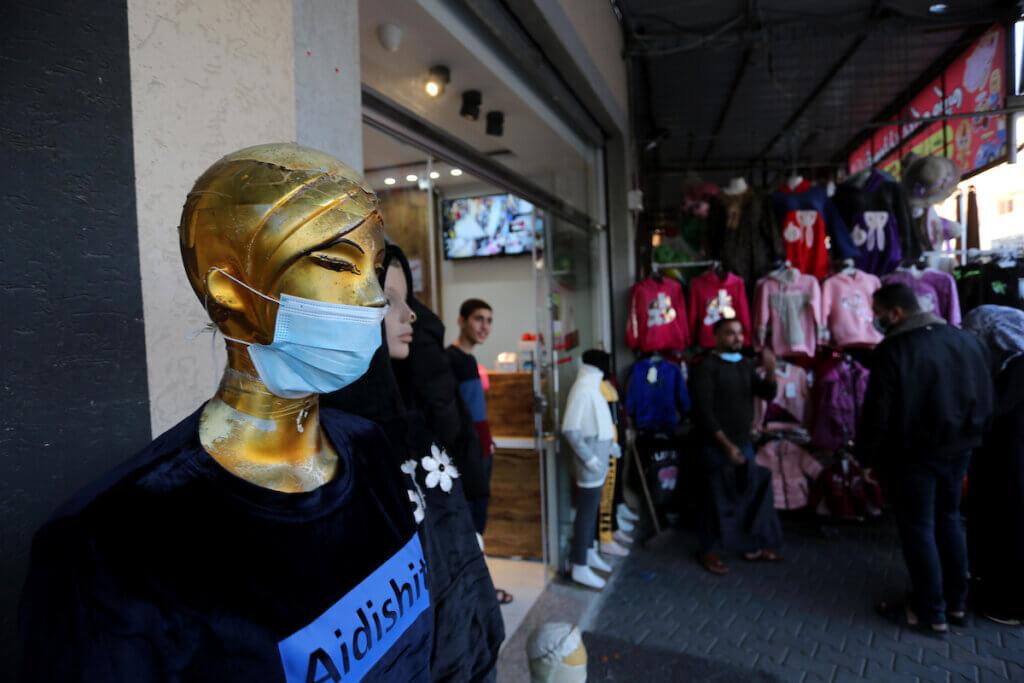The latest:
- 108,280 Palestinians tested positive for COVID-19; 82,809 recoveries; 890 deaths
- Of those who tested positive, 70,865 live in the West Bank, 23,811 live in Gaza; 13,604 live in East Jerusalem
- 342,101 Israelis tested positive for COVID-19; 327,162 recoveries; 2,896 deaths
Palestinians surpassed a grim milestone this week with more than 100,000 confirmed COVID-19 cases, as healthcare officials struggle to control the virus that has nearly overwhelmed hospitals in Gaza, and caused a weekend lockdown in the West Bank. In the last week the West Bank hit its own benchmark reporting more than 1,000 new cases in a single day, hitting a record peak of 1,689 cases in a 24-hour period on Thursday.
At the same time Gaza, where nearly half of all new cases have been reported each day since Wednesday, now accounts for more than 10,000 active cases, around 42% of cases in all of the Palestinian territory.

Tareq Hajjaj reported this week on the European Hospital, Gaza’s only dedicated COVID-19 treating facility for critical cases. He spoke with the director, Dr. Yousef al-Aqqad, who told him ICU is nearly full.
“The hospital is keeping pace with patients who need intensive care, but numbers are escalating fast,” al-Aqqad said “The hospital has not yet run out of options, but we have nothing we can do if critical cases exceed the number of beds we have.”
The big picture: It’s widely considered that COVID-19 is woefully under-recorded in Gaza. The UN has consistently warned in its situation reports that testing capacity is too limited to determine the full scope of the spread. This week the WHO laid out Gaza’s criteria for getting a test: patients either need to be symptomatic or admitted into a hospital for at least 48 hours for other treatment. That’s it. There’s not enough tests to swab those who know they have been exposed, or potential asymptomatic carriers.
Indeed, the WHO went on to note on Thursday, Gaza may very well have run out of tests that same day, “On Dec 1, Gaza Central Laboratory reported critical shortages in COVID-19 detection and extraction kits, with supplies expected to run out by 3 December.” We’re not going to know how this pans out until after the weekend, but Gaza has previously run out of testing kits at least twice since March, and that was when there were around 100 new cases a day, not 800.
The hard numbers: There is a massive undertaking from the WHO and the UN to secure $78 million to respond to the crisis created by the pandemic. The UN updates each week a list of capacity gaps for items they are procuring. It still needs to fund and purchase close to 300,000 tests, and deliver over 200 hospital beds and 170 oxygen ventilators.

Help get PPE and medical supplies into Gaza
In light of the crises that have unfolded over recent weeks, we want to plug two charities that are able to bring urgent medical items into Gaza, which is no small task.
Islamic Relief Canada is partnering with Glia to fund the manufacturing of 3D-printed reusable N95 respirators and face shields. Glia is an open-source medical hardware project that relies on 3D printing to bring low-cost medical supplies to communities that cannot afford or cannot access the devices otherwise. Islamic Relief has provided urgent humanitarian assistance to Gaza for the last 25 years.
We’ve covered Glia’s work in the past on our site and in our newsletter. It’s the brainchild of Dr. Tarek Loubani, a Canadian physician who previously supplied Gaza’s first responders with 3D-printed tourniquets.
Donations can be made through a Launch Good page. For around $7 Glia and Islamic Relief Canada can give one healthcare worker a face shield. For $28, it can print a reusable N95 respirator that a healthcare worker can wear for the duration of the pandemic.
We spoke to Loubani this week over Zoom about how epidemiologists had long warned the virus could quickly overrun struggling healthcare systems in places like Gaza.
“Glia has been manufacturing through the entire pandemic, we knew this day was coming and so we never stopped manufacturing,” he said. “It’s an uncontrolled outbreak now and people are dying.”
Some of the 3D-printed face shields and N95s are made in Gaza and some are made in Canada.
“We always had a plan to do a little bit of importing and a lot of manufacturing, but right now we are very focused on trying to get in what we can and trying to help other organizations get in what they can,” Loubani said.
The N95’s are the newest medical product in the Glia line and is the subject of two peer-review studies, the first study was published by the Public Library of Science in mid-November.
Medical Aid for Palestinians is also fundraising with the Jewish Voice for Peace Health Advisory Council for Continuous Positive Airway Pressure, or CPAP respirators and breathing circuits. CPAP is a noninvasive form of oxygen therapy used to treat COVID-19 patients with respiratory failure.
Medical Aid for Palestinians is a British charity that has operated for 36 years. It has partnered with the British government and EU to provide both urgent medical care and build healthcare infrastructure for refugee communities. In 2019, the charity secured more than $800,000 for essential medications and disposables and lab reagents in Gaza.
Related posts:
Views: 0
 RSS Feed
RSS Feed

















 December 5th, 2020
December 5th, 2020  Awake Goy
Awake Goy  Posted in
Posted in  Tags:
Tags: 
















